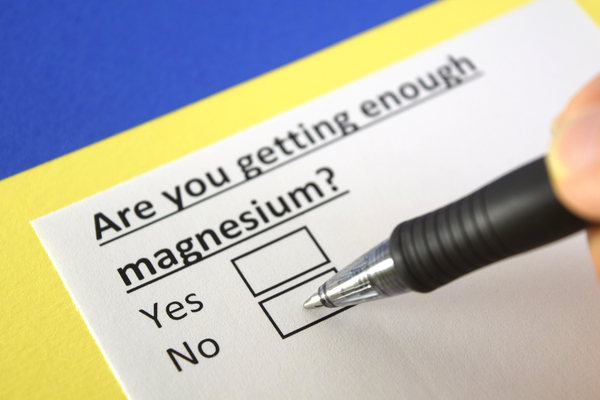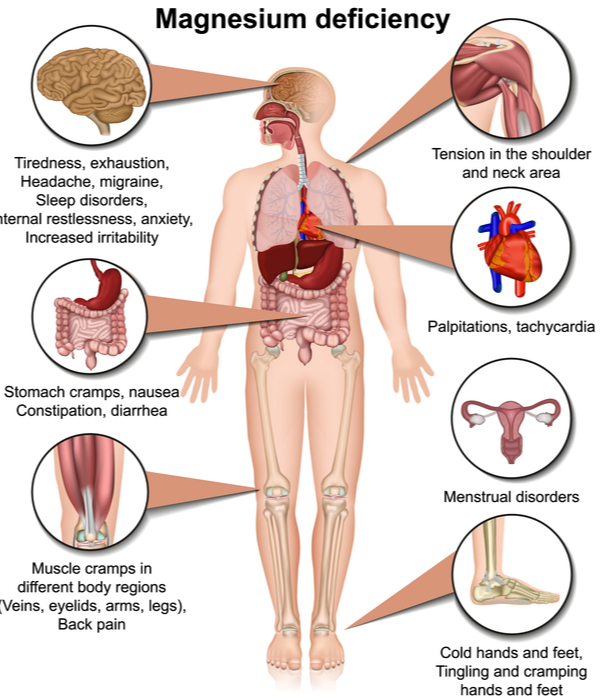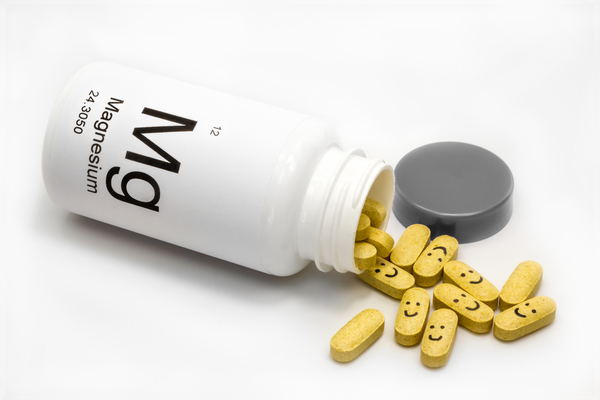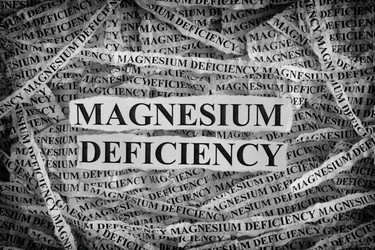Magnesium Deficiency - Signs and Symptoms
Posted by Kylie on 12th Mar 2022
Signs and symptoms you’re probably magnesium deficient

Hypomagnesemia or magnesium deficiency is a condition that results from depleted magnesium levels in the body and magnesium deficiency is widespread. Magnesium is one of the most common minerals in the body and it is responsible for the proper functioning of over three hundred different chemical reactions within the body. Most western diets do not offer enough magnesium and many people are at risk of suffering from magnesium deficiency. One study estimated that as many as 75% of Americans may not get enough magnesium in their diet.
Despite most people not getting enough magnesium in their diet, magnesium deficiency is usually caused by one of two factors - an inability to absorb sufficient magnesium through the gut or passing too much magnesium out of the body through urine. The relationship between proper kidney function as the kidneys are responsible for the regulation of magnesium absorption into the body.
Besides insufficient magnesium intake other factors that can cause magnesium deficiency include alcoholism, chronic diarrhea and diseases like celiac disease and crohn's disease.
If left unchecked, severe hypomagnesemia can lead to life threatening complications such as seizures, arrhythmia and coronary artery vasospasm (sudden tightening of the muscles around the heart)
Symptoms of magnesium deficiency

Initially, magnesium deficiency is likely to present in general feelings of unwellness that may present as loss of appetite, vomiting, diarrhea and general lethargy. If the lack of magnesium levels persist, people are likely to experience specific symptoms that could include such conditions as -:
- Weak bones. The vast majority of the body’s magnesium is stored in bones. Being particularly susceptible to fractures may be an indicator of low magnesium levels, as would osteoporosis
- Hypocalcemia or a lack of calcium in the blood is caused by magnesium deficiency affecting the functioning of the parathyroid glands that release a calcium producing hormone. Hypocalcemia is directly related to hypomagnesemia and if this condition is allowed to go unchecked can lead to weight loss and developmental delay in infants
- Mood swings - much research has been done linking depression to magnesium deficiencies and the related stress factors that trigger depression. Magnesium deficiencies have been linked to anxiety, behavioural disturbances, irritability and in some cases psychosis. Incidentally, data shows that the incidence of depression in particular has been on the rise since many of the natural food sources of magnesium have been removed from western diets.
- MIgraine headaches have been shown to have a relationship to magnesium deficiencies. Stress is known to be a trigger for migraine headaches and stress also causes a depletion in magnesium levels - it is thought that the two factors may be linked.
- Low energy levels - magnesium plays a critical role in regulating energy levels, actively interacting with over three hundred different enzyme systems. A lack of magnesium disrupts important body functions such as muscle function, blood pressure and protein synthesis all of which contribute to the production of energy. Magnesium deficiency may also be related to chronic fatigue.
- Eye twitches - nearly everyone gets the occasional eye twitch, but regular twitching may indicate magnesium deficiencies particularly if you experience the twitching after exercise
- A condition known as myasthenia or muscle weakness which is thought to be caused by a loss of potassium in the muscles - which is known to be caused by magnesium deficiency.
- Severe asthma has been linked to a lack of magnesium in some cases. It is thought that a lack of magnesium causes a build up of calcium in the airways, making breathing difficult.
- Muscle cramping and numbness caused by a lack of connectivity between nerves reliant upon magnesium to be the electrical conductor. These symptoms are again evident after exercise or even during periods of sleep.
- Restless leg syndrome (RLS) a condition that brings on a desire to constantly move the legs or arms in response to disconcerting sensations in the limbs. Scientific studies have linked this syndrome to a magnesium deficiency.
- Severe Premenstrual Syndrome (PMS) symptomatology is an indicator for potential magnesium deficiency. It is not uncommon for doctors to prescribe magnesium supplements to women suffering severe symptoms.
- High blood pressure. A healthy blood pressure reading is typically 120/80. Higher numbers than this indicate higher levels of stress for the heart and blood vessels. This stress can lead to eyesight deterioration, chronic heart disease and increased risk of stroke and heart attack. A lack of magnesium has been demonstrated to contribute to high blood pressure levels.
- Arrhythmia or irregular heartbeat has been linked to a lack of magnesium. Some changes in heartbeat rhythm can have dangerous consequences, potentially increasing the risk of blood clots and heart attack.
- Hearing loss - recent studies have demonstrated a link between magnesium deficiency and loss of hearing
In prolonged cases of magnesium deficiency the risk of serious disease is enhanced. Particular conditions linked to magnesium deficiency include type 2 diabetes, osteoporosis and heart disease.
How to get enough magnesium

The best form of cure is prevention and getting enough magnesium in your diet is a great way to maintain your overall health. Adult males are required to have a daily intake of approximately four hundred milligrams of magnesium while females are required to have a daily intake of approximately three hundred and sixty milligrams. This calculated allowance is referred to as the reference daily intake or RDI. The average western diet lacks a lot of natural magnesium and it may be necessary to tweak your diet to get your average daily intake or to use magnesium supplements.
Natural food sources that have high magnesium content include -:
- Leafy green vegetables like spinach, kale, turnip and mustard greens have high magnesium content. Just one cup of spinach contains about 39% of your RDI of magnesium. Leafy green vegetables also are rich in other vital nutrients, making them an excellent menu choice.
- Some species of fish including salmon, halibut and mackerel have a high magnesium content as well as being extremely nutritious. Just one hundred and eighty grams of salmon (an average half fillet) will contain approximately 13% of the RDI.
- Avocados contain approximately 15% of RDI as well as being an excellent source of fibre and being rich in potassium, vitamins B and K and healthy monounsaturated fats.
- Nuts in particular, almonds, brazil nuts and cashews have high magnesium content. A twenty eight gram serving of cashews contains a whopping 20% of an adult’s RDI
- The legume family which includes various beans, lentils and chickpeas contains significant levels of magnesium. One cup of cooked black beans has approximately 30% of an adult's magnesium RDI
- Tofu or bean curd as it is sometimes called, being made from pressed soybeans has a high magnesium content. A one hundred gram serving of this vegetarian food staple contains over fifty milligrams of magnesium which equates to just over 13% of RDI
- Seeds are great sources of fibre and some of them, particularly pumpkin and flax seeds contain extremely high levels of magnesium. Just twenty eight grams of pumpkin seeds contain nearly 150 milligrams of magnesium.
- Whole grains like buckwheat and quinoa are extremely rich in magnesium
- Bananas are well known for having high potassium content but also are a great source of magnesium. Just one banana has approximately 9% of an adult’s magnesium RDI
- Dark chocolate may come as a bit of a surprise but dark chocolate has some surprising health benefits including being a rich source of magnesium. To get the most benefit from dark chocolate it is recommended that you choose a chocolate that contains 70% cocoa solids at a minimum.
If you are unable to source magnesium through your diet,there are still ways to add magnesium to your diet.
Magnesium Supplements are available in tablet, capsule or powdered form. The exact quantity of magnesium needed will vary in line with specific ages and needs. Regular doses of magnesium should only be taken to complement your dietary requirements. Adult doses typically range from between 200 and 500 mg. Regular oral supplementation will assist you to meet your Recommended Dietary Allowance (RDA).
Specific dosages will be dependent upon each individual's age and personal circumstances. Babies under the age of six months need as little as 30 milligrams per day while adults over 50 may require 420 milligrams per day.
As well as being available in oral supplements Magnesium oil can be applied topically. When the oil is applied topically, it is absorbed by the skin and into the bloodstream. Magnesium flakes can also be used for transdermal absorption of magnesium. Transdermal absorption is thought to occur when taking warm baths in a magnesium chloride solution. Topical application and transdermal absorption are thought to be most appropriate for treating muscle soreness and joint stiffness. While magnesium oil topical application can certainly help, oral supplements are going to be more effective in addressing any magnesium deficiency.
General symptoms of magnesium deficiency can be quite hard to attribute to being magnesium deficient as many symptoms could be put down to a variety of causes.If you suspect that you may be suffering from a lack of magnesium you can consult your physician who will be able to conduct a blood test to give you a clear picture of your magnesium levels.
Whatever the outcome, a good strategy to maintain magnesium levels is to ensure that your diet is full of magnesium rich foods such as leafy green vegetables, whole grains, nuts and fish. If you are concerned that your diet does not contain enough natural sources of magnesium you can increase your daily intake by using magnesium supplements in tablet, capsule or powdered form.
Keeping magnesium levels at appropriate levels will help your body to function as it should while keeping your mind functioning at optimum performance!

